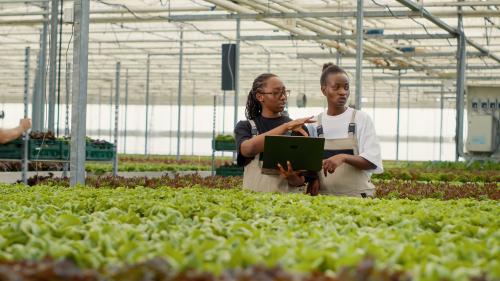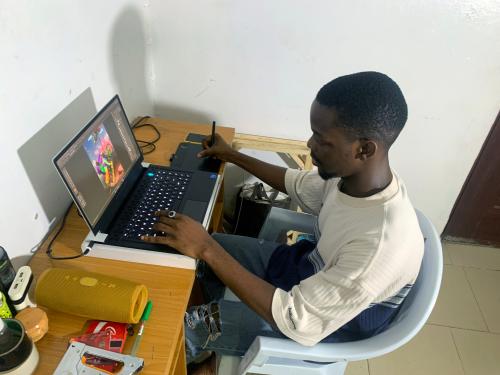This viewpoint is part of Foresight Africa 2024.
Today, according to the World Bank’s classification, 31 out of 54 African countries outgrew the low-income category.1 These countries accounted for more than 80% of the continent’s GDP in 2023, according to the IMF estimates from the World Economic Database. To escape the so-called middle-income trap, countries need to shift their growth drivers from efficiency to innovation. Today, African MICs as a group are characterized by their potential, but also by limited capacities for innovation and creation of productive and green jobs.
The creation of productive jobs is the continent’s key priority as it will determine whether Africa will utilize its demographic opportunity. Currently, about 60% of Africa’s population are below the age of 25. The UN projections indicate that by 2050, Africa will account for more than 25% of the world’s population. This trend brings both enormous opportunities and challenges. While education attainments in Africa have been improving, the labor market outcomes are less impressive, with high youth unemployment prevailing in several middle-income countries and high working poverty in low-income countries.
For a large number of Africa’s high-potential youth, entrepreneurship, through startups, offers not only a chance to build sustainable livelihoods and even wealth but also to integrate into society. Many policy dimensions were discussed at the Africa Startups conference in Algiers December 2023. Below are policy options for boosting African startups.
To escape the so-called middle-income trap, countries need to shift their growth drivers from efficiency to innovation.
Address access to finance: A fund of funds to improve start-up financing
Beyond mobilizing additional finances, creating an African fund of funds, that is African fund investing in other funds that fund start-ups, can de-risk start-up financing by spreading out the overall funding into many different venture capital funds. This approach could draw in more risk averse investors and even attract substantial funding from the governments and thus become an effective tool of industrial or other type of public policy. It could incentivize start-ups to strive to address major societal issues such as climate change or gender inequality while tackling Africa’s specific needs.
The fund could encourage the sharing of knowledge and skills across African countries, thus strengthening the startup landscape. It would stimulate African startups to grow, tackling the “missing middle” and the prevalence of small firms in key sectors, including manufacturing. In short, such funds for African startups could be an influential investment for the future of Africa, powering up its businesses to drive strong, connected, and lasting growth while also aligning the private sector with government objectives.
Turn youth brain drain into brain circulation through Africa startup visa
To become knowledge economies with a conducive climate for startups, African countries need to tap into their talent abroad through diaspora networks. Countries of origin can reap benefits in several ways, including through the transfer of knowledge and capital. A start-up/innovation visa can be one of the tools for turning brain drain into brain circulation. Start-ups initiated by diaspora and/or joint ventures between nonresidents and residents could help strengthen the rule of law, and business climate and eventually create an environment where incentives to migration are less pronounced.
More broadly, African startup visa would let entrepreneurs from all over the world start firms in Africa, with a view to generate innovative business ideas. So far, adoption of this regime has been limited, even though some countries (Algeria, South Africa, Tunisia, Botswana, and Nigeria) are considering it. South Africa is currently in the process of finalizing ‘tech visa’, with the aim to attract international tech talent and support startup tech ecosystem. Given its flourishing tech scene, a startup visa in Kenya could bolster its position as a leader in African tech innovation.
Boost startups through information generation and sharing
Access to information, on markets, policies and regulations, technology etc., is key for startups. An “Africa startups platform” could be impactful in this regard as it would provide startups with fast and reliable information on African economies with relevant indicators, regulations, and policies. It would also provide united start-up database with information on existing startups that could be relevant both for other or aspiring startups, investors, and policymakers.
An African Startups Business Conditions Index, based on regular surveys of startups in Africa, would help policymakers to recognize the obstacles startup face and their needs, and how they view policies. This index would facilitate design of appropriate policies, harmonize them at the continental level and improve business environment. It would also shed light on factors driving high start-up exit rates.
Climate tech startups can contribute to addressing climate crisis2
Climate change mitigation and adaptation are pivotal areas where African countries can launch joint R&D projects, fostering an ecosystem of startups around continental climate innovation. The challenges and opportunities presented by climate change are particularly poignant for African startups due to the continent’s vulnerability, stemming from its geographical and economic circumstances. Startups face numerous challenges, including the impact of climate change on agriculture, operational disruptions, and financial constraints. However, these challenges are matched by opportunities: the demand for innovative solutions to climate-related issues, the shift towards green technology, access to climate finance, the ability to influence policy, and the creation of jobs in new, sustainable sectors.
Joint climate research initiatives, cross-border innovation in renewable energy, shared resources for sustainability projects, and climate-resilient agricultural technologies are just a few areas where collaborative R&D can be transformative. Furthermore, data sharing for climate modeling and prediction, networking, access to pan-African and global markets, and capacity building, are critical for this cooperative approach.
Amplified and focused African voice in global economic forums
Collaboration with the African Union will be critical for success of the start-up agenda. The AU has gained a seat at the G20 (G21), which could be utilized for presenting Africa’s interests in a focused and coordinated way at the G20 to ensure that Africa’s start-up initiative receives adequate support.
-
Footnotes
- For the 2023-2024 fiscal year, the World Bank defines middle income countries as those with GNI per capita (the Atlas method) were between 11,36 USD and 13,845 USD in 2022.
- Gitahi, W. 2023. “The Catalyst Fund: Championing climate tech innovation in Africa.”
The Brookings Institution is committed to quality, independence, and impact.
We are supported by a diverse array of funders. In line with our values and policies, each Brookings publication represents the sole views of its author(s).








Commentary
Leveraging innovativeness of Africa’s youth through startups
September 12, 2024